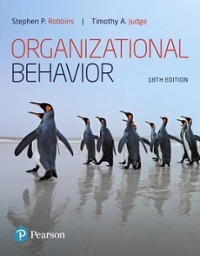The message from the business press has been consistent: Dont count on long-term employment. For years, job
Question:
The message from the business press has been consistent: Don’t count on long-term employment. For years, job seekers have been told they should expect to be responsible for their own careers and prepare for the possibility that they will be changing jobs frequently. A simple look at employment trends also confirms that highly routine and well-defined jobs have been decreasing in number. The shift has often been described in positive terms. Managers work to create organizations that have laudable characteristics like adaptability, flexibility, and creativity. Author Micha Kaufman notes that doing well in contemporary business environments means “having the flexibility to let go of the ideas of the past, the courage to constantly reevaluate plans for the future, and the presence of mind to adapt to life, as it is, in the moment.” There is a lot of appeal in creating your own future at work.
At the same time, many workers land in precarious positions. Researchers find that individuals who feel insecure or uncertain about future employment experience higher levels of psychological strain and worry. Insecure workers also get sick more frequently. Contrary to the positive image of the freelance worker with boundless energy and creativity, evidence shows that for many individuals, a lack of job security can result in exhaustion and an apprehensive approach to work problems.
Corporate leaders ask themselves what their role in creating job security should be. Some note that companies built around stability and security are less likely to compete successfully and may go out of business. Many organizations try to maintain flexibility and a certain level of security. For example, Scripps Health has maintained a pool of internal transfer opportunities and training assignments for individuals whose job functions are no longer needed. As a result, even within the highly volatile health care industry, it has been able to avoid layoffs. However, systems that provide job security do not come cheaply nor are they feasible for all companies.
Questions
1. Do you think that stability is good or bad for employees? Explain your answer.
2. Do employers have an ethical responsibility to provide security for employees or just a warning about a lack of security?
3. If long-term employment security isn’t feasible, what alternatives might employers provide to help employees make smoother transitions?
Step by Step Answer:

Organizational Behavior
ISBN: 9780134729329
18th Edition
Authors: Stephen RobbinsTimothy JudgeTimothy Judge, Timothy Judge





